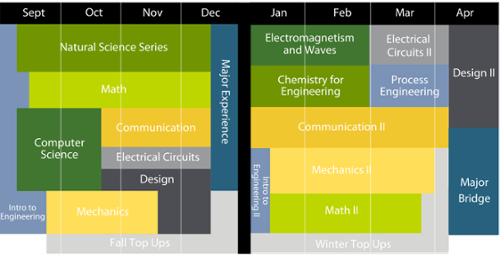For the most part, engineering education hasn't fundamentally changed in 100 years or longer. Until now. We rebuilt our first-year program from the ground up so you can gain the skills and knowlege you need for your degree and your career as a licensed professional engineer.
RE-ENGINEERED is the most innovative first-year program in Canada.
Introducing RE-ENGINEERED
How is it different?
Timetable: We've changed the first-year engineering timetable to help you with school/life balance.
Course Content: We've made your classes broader and more relevant to real-world engineering.
Grading: You'll be graded on your competency and skills, not how well you can memorize large amounts of material.
Timetable
Redesigned to support your learning and school/life balance
Consistent Schedule: All first years share the same schedule, with no night classes and a common lunch hour, so it's easier to have community-building social events and extracurriculars, or fit in some exercise.
Modular Courses: Instead of taking five or six classes that last the full semester, courses will be shorter so we have the flexibility to cover more essential material with you.
Just-in-Time Learning: Material will be carefully sequenced, so when you learn material in one course, you'll be able to immediately apply it in another.

Course Content
We've revitalized first year to get you inspired and excited about engineering.
Strong transition to engineering
- Summer top-ups before your classes start in fall, so you know you're prepared for first year
- Review of life and study skills, including time management, critical thinking and peer-to-peer teaching skills
- Introduction to engineering: scope of the profession and career paths
Broader exposure to natural sciences
- Get a strong introduction to the natural sciences in fall term, rather than taking one natural science elective
- Take short courses in chemistry, biology, physics and geology
- You'll understand how the sciences relate to each other and engineering
Introduction to all engineering disciplines
- Spend a day with each of your top discipline choices before end of Fall Term
- Choose your discipline before end of Winter Term
- Do Discipline Bridge Course at end of Winter Term to get motivated and excited about second-year engineering
Holistic approach to the engineering profession
- Business content focussed on awareness of entrepreneurship and how that relates to design
- Understand and appreciate the importance of respect, diversity, and inclusivity
- Learn Indigenous cultural context, setting the stage for integration of Indigenous content in the curriculum
At the end of your first year you will be more employable with:
- Proficiency in one computer-programming language
- Design and computer-aided design skills
- Training in basic first-aid, CPR, and WHMIS training
- Understanding of an engineer's professional obigation for health and safety
"We want to minimize academic attrition by supporting students better and by co-ordinating what we're doing across the courses better. It won't be easier, but it will be more supportive and thorough."
-Professor Sean Maw, PhD, PEng, Jerry G. Huff Chair in Innovative Teaching and team member on the RE-ENGINEERED first-year redesign team
First-year classes
The new first-year program
In RE-ENGINEERED, your first-year classes will be shorter and more intensive so you can learn a broader range of material. These essential skills will form the strong foundation you need for the rest of your degree.
| Course | Description |
| Introduction to Engineering | |
| Mechanics (Dynamics and Statics) | |
| Design | |
| Engineering Mathematics | |
| Electrical Circuits | |
| Engineering Communication | |
| Additional first-year courses | |
| Computer science | |
| Natural sciences and their connection to engineering | |
| Process Engineering | |
| Hands-on experience in the engineering disciplines | |
All first-year engineering students admitted to the College of Engineering take a common set of classes in the RE-ENGINEERED first year before applying to enter their specific discipline.
Grading
Refocused so you can master the skills you need
Evaluation throughout the semester: You will be tested on modules of content throughout your courses using competency-based assessment.
70 percent minimum on basic material: You will need to achieve a mark of at least 70 percent on material involving facts, concepts, basic computations, and procedural steps, as well as basic integrative problems in the course. There will be no minimum standard for the very advanced material.
No final exams: Final exam periods in December and April will be used for discipline-specific, hands-on learning.
Choosing your discipline
You'll choose your engineering speciality, or discipline, near the end of first-year. We'll help you learn about the various disciplines during first-year.
After you choose your discipline, it will be your focus for the rest of your degree.
USask Engineering offers degrees in eight disciplines, all accredited by the Canadian Engineering Accreditation Board.
Learn more about each discipline on the USask Admissions site:
- Chemical Engineering
- Civil Engineering
- Computer Engineering
- Electrical Engineering
- Engineering Physics
- Environmental Engineering
- Geological Engineering
- Mechanical Engineering
Options
You can further enhance your education by taking additional specialized training in the following:
- Mining Option. This option is available in our mechanical and geological engineering programs.
- Petroleum, Mineral Processing and Biochemical Options. These options are available in our chemical engineering program.
Questions?
Interested in applying? Learn about admission requirements and deadlines and access the online application on the USask Admissions site.
Contact the Engineering Student Centre if you have more questions.

